Aqualide
The aqualide is the editing system of the mind. It coordinates all the events that occur in human nature, and selects the contents that become conscious.
I) In Freud’s 1900 Topic of the Mind, one finds several crucial articulations which require editing and translation of information.
- In the senses physical stimulation is transformed into neurological activity. This neurological activity has a set intensity that can be far less intense than extreme cold or extreme brightness. Each sensory organ reacts to different types of stimulations, but they are all translated into the same type of neurological information. Thus, these initially varied forms of information can be associated and memorized.
- The next editing system translates neurological dynamics into psychological representations that can eventually be perceived consciously. This second editing system pours its productions into the Freudian unconscious. Most of this information has low intensities, comparable to those managed by the brain.
- A third editing system regulates how information passes from the unconscious to the preconscious. The basic rule is that the more intense unconscious material becomes, the more strongly it attempts to reach consciousness. The third editing system is also referred to as a watchman, or a system of censorship, which has the function of protecting consciousness from having to deal with conflicting information that consciousness cannot manage without dysfunctioning. The problem stressed by Freud in his description of hysterical patients is that this censorship tends to give more importance to consciousness than to the organism’s survival potential. In other words, this editing system has "local” preoccupations, rather than global ones.
- A fourth editing system is really a final protection of consciousness, as it regulates how preconscious material flows into consciousness. The main preoccupation here is that consciousness can only deal with a few pieces of information at a particular moment.
- A fifth editing system retranslates psychological experiences into neurological dynamics capable of regulating how consciousness and motor functions interact.
II) Aqualidology is an attempt to understand how such editing systems function and how they are coordinated. The term "aqualide” attempts to convey my intuition that the coordination of these editors forms the background of explicit conscious events that tend to swim in what could be described as "atmospheric” variables. Psychotherapists often try to focus on atmospheric impressions that may lead them to hidden memories, wishes and affects. I used Freud’s familiar model to provide to the reader an intuition of what is meant by editing devices. However, today one needs more complex models of the mind to understand and manage editing systems. Here are a few important differences:
- Most researchers no longer assume a strict boundary between psychological and somatic processes[1]. One prefers to look for intermediary levels of mechanisms that manage different types of information. For example, a nervous stimulation and a muscle contraction are entirely different mechanisms that can nevertheless be fruitfully associated. Between a purely conscious activity and a purely biological activity, such as digestion, one finds a web of mechanisms that coordinate more or less loosely a highly varied set of information processing mechanisms. The implication for psychosomatics is that no direct link can exist between the digestive tract and a conscious representation, but that a wide variety of indirect connections may nevertheless activate correlative and even complementary activities between biological and psychological mechanisms.
- There is not just one consciousness, one unconscious, one bodily signal and one verbal signal. Plurals can be applied to all such terms. One implication is that one needs to differentiate what was previously called unconscious activity in at least two categories: nonconscious and unconscious activities. Currently, psychologists tend to use the term unconscious to designate previously conscious constructions that can momentarily no longer reach consciousness. However, like books lost in a library, these events may become conscious again, as shown by Freud and many other psychoanalysts. The term nonconscious tends to designate mechanisms that are not designed to become conscious. For example, mechanisms such as editing systems, or Freud’s defense mechanisms, regulate consciousness; but individual consciousness does not have the means to explore, through introspection, such mechanisms. Nonconscious mechanisms are often too complex and too numerous to become accessible to the sequential, slow analysis of consciousness.
- This brings us to a reformulation of psychological mechanisms. They are all at the least nonconscious, and some may require more or less important contributions from conscious processing capacities. A conscious perception is thus the tip of an iceberg that tends to float in an ocean of nonconscious processes. From this perspective, what Freud really discovered is that the coordination between nonconscious and conscious processes may be damaged. This form of damage is a characteristic of most forms of psychopathologies, especially when the damaged behaviors have a crucial survival value.
Michel Heller
Assens, 11.24.2003
[1] In many books one finds a small chapter on parallelism described as an ancient theory that has lost its purpose. Personally, I think that the model still thrives today, and cannot yet be kicked away because one still does not know of what stuff dreams are made of.
News
-
For a new psychosomatic: what breaths between head and legsPsychotherapy of an organism (presentation & workshop) Symposium of the Le Noirmont ... more info
-
Michel Heller is interviewed by Helen Payne on body psychotherapy and researchOn a life trying to understand individuals as an organismic system, in which psychological, ... more info
-
Michel Heller (2022). L’organisme intime. Approches psycho-corporelles des troubles fonctionnels. Paris : L’Harmattan.The Intimate Organism is an analysis of the use of mind-body approaches to treat patients who ... more info
Quotes
-
Pierre Janet:«More generally, can we precisely separate physiological functions and psychological functions? Neuropathic disorders [...] are the expression of the activity of the entire organism, of its growth, its evolution, its involution. [...] Psychology is not independent of physiology, but it requires a more delicate, deeper physiology than that of digestion or respiration. The study of nervous and mental illnesses, far from being able to do without physiological and medical knowledge, will increasingly require much more in-depth physiology and medicine.” » (Pierre Janet, 1923, La médecine psychologique, III.II.2, p. 151)
-
Lamarck: Biological flexibility«Le point essentiel à considérer est que, dans tout système d’organisation animale, la nature ne peut avoir qu’un seul moyen à sa disposition, pour faire exécuter aux différents organes les fonctions qui leur sont propres.» (Jean-Baptiste de Lamarck, 1809, Philosophie Zoologique, III, Introduction, p. 464) NB The english translation does not accept this point of view.
-
The soul according to Descartes« Art. 30. The soul is in a very real sense joined to the whole of body, and that it cannot stritctly speeking be said to be in one of its parts to the exclusion of the rest, first because the body is a unity and in a sens indivisible, on account of the disposition of its organs, which are so closely connected with one an other that, when one of them is removed, the whole body is rendered defective; and secondly, because the soul is of a nature that has no relation to extension ot to the dimensions or other properties of the matter of which the body is constituted, but relates only to the total combintation of the body's organs.» (René Descartes, 1649, The Passions of the Soul, p. 207, translation by Michael Moriatry)
-
"Good sense is the most evenly shared thing in the world,""for each of us thinks he is so well endowed with it that even those who are the hardest to please in all other respects are not in the habit of wanting more than they have." (Descartes, Discourse on the Method of Properly Conducting One's Reason and of Seeking the Truth in the Sciences I. Translator: F. E. Sutcliffe)
-
As man thrived in different regions of the globe, he increased in number, established in society with fellow creatures,"and finally progressed and became civilized, his delights, his needs, increased and became more and more diversified ; he developed increasingly varied ways of relating to the society he lived in, which, among other things, generated increasingly complex his personal interests. His inclinations subdivided endlessly, generated new needs that activate themselves beyond the scope of his awareness. These grew into a huge mass of links that control nearly every part of him, without him being able to perceive it." (Lamarck, Lamarck, Histoire Naturelle des Animaux sans Vertèbres , vol. 1, 1815 : 278). Translated by Marcel Duclos and Michael Heller
Books of Michel Heller
-
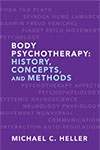
Body Psychotherapy
history, concepts & methods
New York: W.W. Norton, 2012
more info + order -
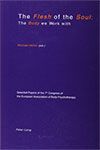
Flesh of the Soul
The body we work with
Bern: Peter Lang, 2001
more info + order -
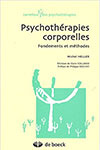
Psychothérapies corporelles
Fondements et pratiques
Louvain: DeBoeck, 2008
more info + order -
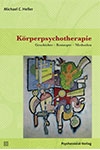
Körperpsychotherapie
Geschichte - Konzepte - Methoden
Erschienen im Oktober 2017
more info + order -
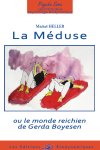
La Méduse
ou le monde reichien de Gerda Boyesen
Les Editions Biodynamiques
more info order -

L'organisme intime
Approches psychocorporelles des troubles fonctionnels
more info + order
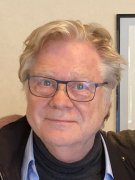
Michel Heller, Docteur in psychology & sport
Psychologist & Psychotherapist AVP/FSP/EABP
Avenue Virgile-Rossel 18
1012 Lausanne
021 683 17 47
Languages spoken : English & French
IMPORTANT: For an appointment, please telephone.

painted by Joanna Raphael